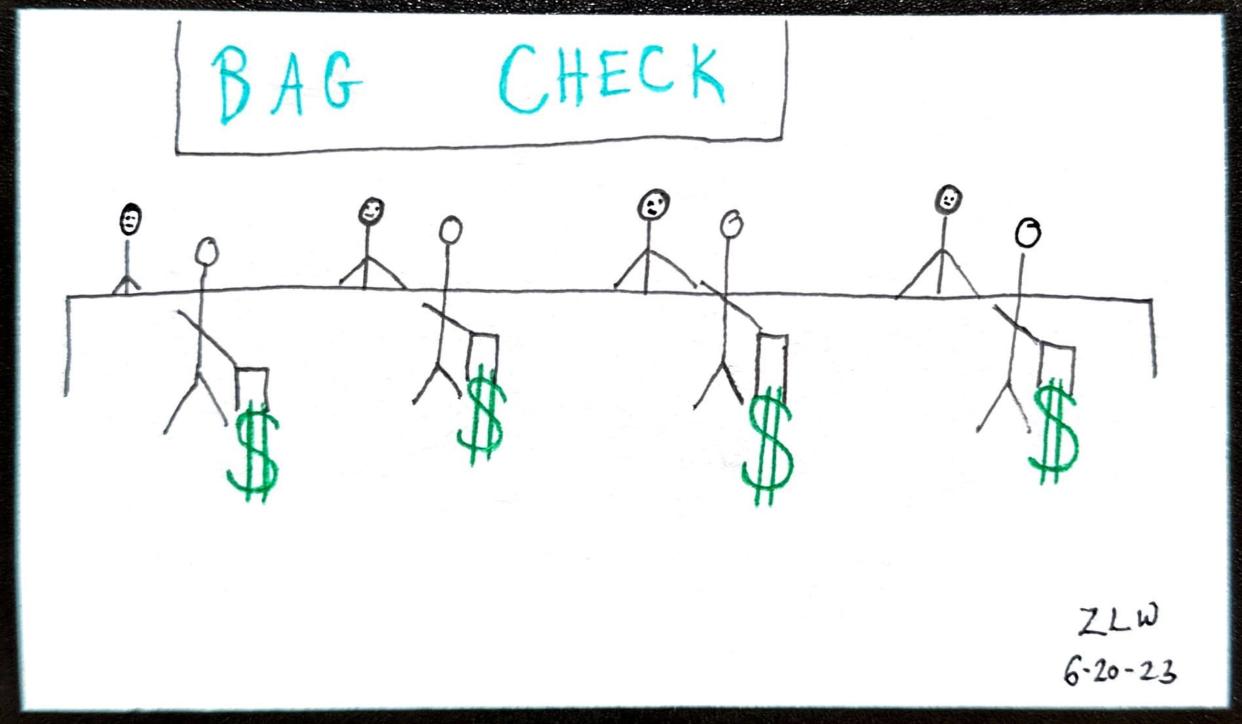Cha-ching: Airlines make bank from bag fees even if you hate them | Cruising Altitude
Apparently, a 200-word story about American Airlines adding a $75 fee for bags on long-haul flights for basic economy ticket holders, is what it takes to grab your attention!
And so, naturally, I want to give you more of what you want – or I suppose, don’t want.
Bag fees were first introduced in the 1970s by People Express, the pioneering low-cost carrier out of Newark, New Jersey, according to Henry Harteveldt, president of Atmosphere Research, a travel industry analytics firm. But, he said, they didn’t become ubiquitous until much later on.
“In 2008 there was an oil crisis and oil spiked to close to, if not more than, $150 a barrel,” Harteveldt told me. “American was the first airline to announce it would charge its coach passengers a fee to check a bag.”
Most of the other airlines quickly followed suit and now almost all the major U.S. carriers have fees to check bags for most economy passengers. Southwest Airlines is the notable exception.
Harteveldt said airlines know their passengers hate these nickel-and-diming fees on paper, but that in the end, they’re just too much of a goldmine to give up.
Just last year, U.S. airlines collected nearly $6.8 billion in bag fees, according to the Department of Transportation.
Surprisingly, fees are becoming more popular with passengers in some ways too.
“One thing that our research has shown is that more than two-thirds of U.S. leisure airline passengers now feel that the unbundling of the coach product and letting people buy what they want and need on an a la carte basis is actually something they like because it helps them stick to their budget,” Harteveldt said.
So, will airline bag fees ever go away? Here’s what Harteveldt told me travelers should know about how all this works:

Will airline bag fees ever go away?
No. It’s very unlikely unless legislation comes along that forces carriers to roll the cost of bags into a ticket. But, as Harteveldt said, that would likely be an unpopular move even with most travelers at this point because it would mean higher base airfares, and it’s unclear if people would want to pay for those costlier tickets.
“There is a risk that if the government told airlines that they have to include checked baggage as part of the base fare then I think airlines would raise fares. By how much, I don’t know because that’s a competitive matter,” he said.
Are more airlines going to start charging for carry-on bags?
Low-cost carriers like Spirit and Frontier already charge passengers for space in the overhead bins, and Harteveldt said other airlines do, too, though not as explicitly.
“This is why airlines sell priority boarding. It increases the likelihood, though it does not guarantee, that there will be space in the overhead bin,” Harteveldt said. “It’s also why airlines have multiple boarding groups. They use the multiple boarding groups as a way to encourage loyalty.”
Are there any ways to avoid paying bag fees?
Yes. And airlines want to dangle them in front of you.
“Airlines know it’s become a game. They’re willing to put up with that,” Harteveldt said.
Partly that’s because comped bag fees are a good way to encourage loyalty, and that means the airlines make money whether you pay the bag fees or not.
Many airlines start waiving the fee to check bags once a traveler achieves elite frequent flyer status in their loyalty programs, and encouraging travelers to achieve that status to reap the benefits is good for airlines’ bottom lines.
Airlines also often comp those checked bag fees for passengers with lucrative co-branded credit cards. Those credit card partnerships can sometimes make the airline more money than selling its own tickets does.
And beyond those more obvious ways of getting your bag fees covered, Harteveldt said, playing your cards right around bin space can work in your favor too. Airlines routinely ask passengers to check their carry-on bags for free at the gate as a way to avoid delays in boarding.
“It helps ensure a better boarding process, it helps ensure an on-time departure,” Harteveldt said. “You can game the system.”
Last week's Cruising Altitude: Airlines don't just want your money. Now they want more of your data.
Some travelers also choose to ship their luggage rather than deal with paying airlines for the service, although that, too, can become a risky proposition. Some travelers say it’s just more convenient to get door-to-door luggage service if you’re going to have to pay for it, anyway.
Harteveldt noted, however, that airlines typically refund your bag fees if your luggage is lost or delayed, which may not happen with a non-airline courier. He added that passengers should always ask for a refund if something goes wrong, in case it isn’t automatically applied.
For occasional travelers though, the best advice to avoid checked bag fees and other associated headaches remains don’t check a bag.
Zach Wichter is a travel reporter for USA TODAY based in New York. You can reach him at zwichter@usatoday.com
This article originally appeared on USA TODAY: Cruising Altitude: Bag fees are too profitable for airlines to go away